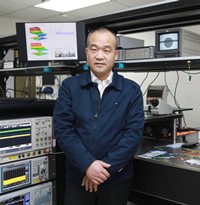
Dou Xiankang is the current president of Wuhan University (WHU) and the deputy secretary of the Party Committee. Born in Sixian, Anhui Province in January 1966, he joined the Communist Party of China (CPC) in October 1985. President Dou studied in the Department of Earth and Space Sciences at the University of Science and Technology of China (USTC) from 1983 to 1988, receiving his bachelor degree in 1987 and master degree in 1988. He studied at Paris Diderot University in France from 1989 to 1993, graduating with a master and a Ph.D. degree. He continued his postdoctoral research at the Centre National de la Recherche Scientifique (CNRS) in France between 1993 and 1995. He started teaching at USTC in 1995 and was promoted to professor in 2000, successively serving as the deputy director and the deputy secretary of the CPC Branch of the Department of Earth and Space Sciences, the executive vice dean and the secretary of the CPC Branch of the School of Earth and Space Sciences, the executive dean of the School of Earth and Space Sciences and the assistant to the president of USTC. He was the vice president and a member of the Standing Committee of the CPC of USTC from 2005 to 2015, and the executive deputy party secretary and the vice president of USTC from 2015 to 2016. He was appointed the president and a member of the Standing Committee of the CPC of WHU in December 2016, later becoming the president and the deputy party secretary of WHU in April 2017. He was granted special government allowances from the State Council in 2004 and awarded The National Science Fund for Distinguished Young Scholars in 2010. His research group received a grant for Innovative Research Group by the National Natural Science Foundation of China in 2011 and an honor for Innovative Research Team in Key Areas by the Ministry of Science and Technology in 2015. He was also selected as a leading scholar of technological innovation in the “Ten-thousand Talents Plan” in 2016 and a member of the Chinese Academy of Sciences in November 2017.
President Dou has been engaging in theoretical, observational and experimental research on the stratosphere and mesosphere over a long period of time. He has led his team to independently develop two advanced experimental systems, namely, the Mie-Rayleigh-Na fluorescence dual wavelength laser radar and vehicle-carried Doppler wind radar, as well as the first quantum lidar based on up-conversion technology in the world, which has filled domestic research gaps with cutting-edge technology and created a new lidar detection system. Based on his pioneering work on observation equipment, a series of systematic and innovative achievements in the dynamics and photochemistry of the mesosphere have been made by him. He has obtained 27 national invention patents and published more than 110 academic papers in international SCI journals. His academic achievements have won him the First Prize of Natural Science of Anhui Province in 2017. His major academic contributions can be summarized as follows. Firstly, he has promoted the development of lidar detection technology by creating the first quantum lidar based on up-conversion technology in the world, which has laid a solid foundation for researching the dynamics of the stratosphere and mesosphere. Secondly, he has revealed the interactive mechanism between the neutral atmosphere and ionic component through the independently-developed observation equipment. Thirdly, he has provided several mechanisms that explain how atmospheric fluctuations affect the variability of the stratosphere and mesosphere, which serves as a foundation for modeling and accurate prediction of the stratosphere and mesosphere.
From 2012 to 2017, the research team he led has published 48 papers on the study of the stratosphere and mesosphere in the leading Journal of Geophysical Research, ranking second only behind the National Center for Atmospheric Research (NCAR) of the United States in terms of the number of papers published in the journal among all similar research institutes and universities in the world. As an outstanding instructor, he has won the prize of Supervisor of the National Excellent 100 Doctoral Dissertation Program issued by the Ministry of Education in 2009. He has built the research team on the study of the stratosphere and mesosphere at USTC, promoting the development of space physics. Under his leadership, the Key Laboratory of Geospace Environment of the Chinese Academy of Sciences (CAS) was rated as an Excellent Laboratory in the five-year evaluation in 2014 (The excellence rate is 20%). To summarize, Dou Xiankang’s theoretical, observational and experimental research on the stratosphere and mesosphere has been pioneering in China. The combination of equipment development, observation and theoretical research, in particular, has made innovative contributions with international impact in the study of the dynamics and photochemistry of the stratosphere and mesosphere.